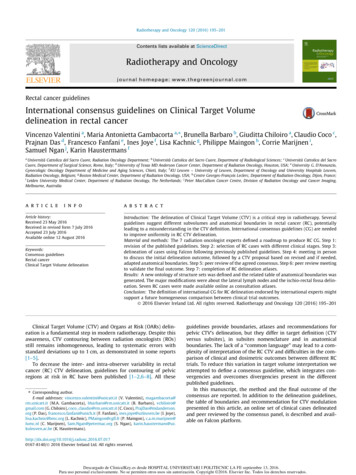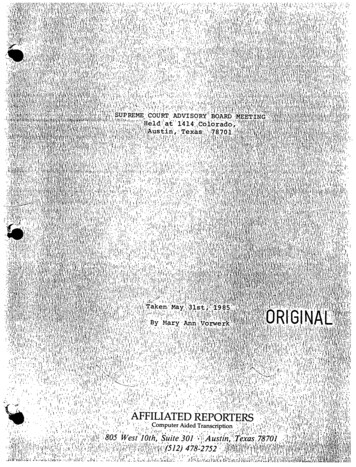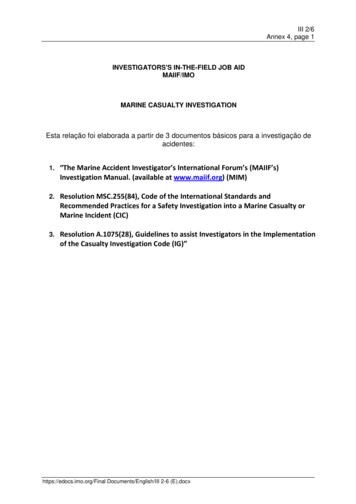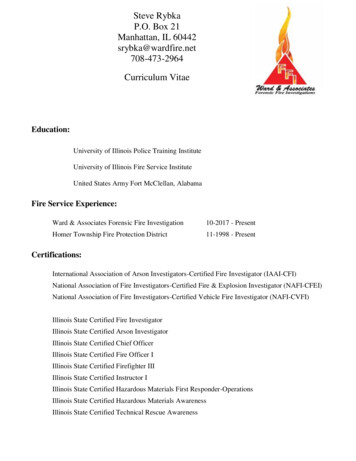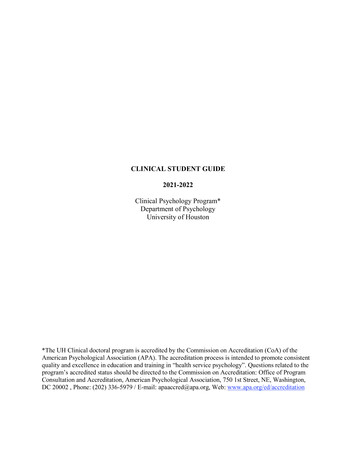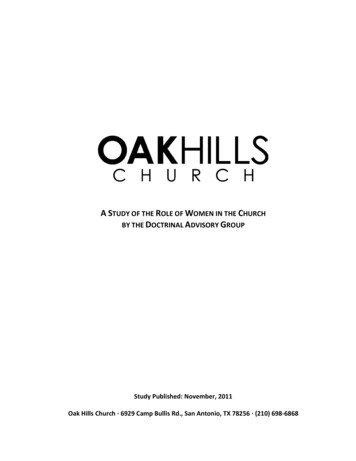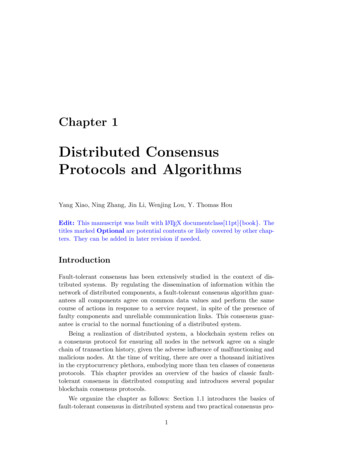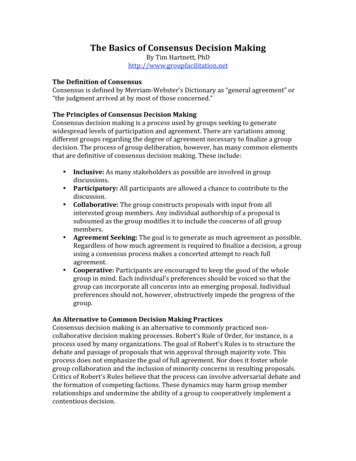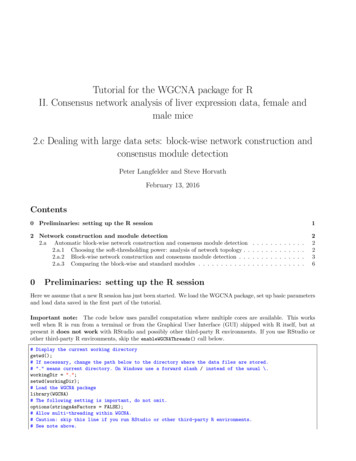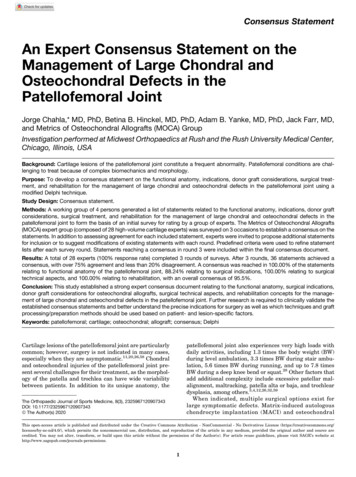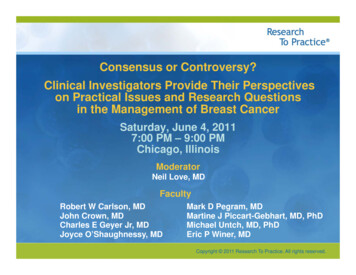
Transcription
Consensus or Controversy?Clinical Investigators Provide Their Perspectiveson Practical Issues and Research Questionsin the Management of Breast CancerSaturday, June 4, 20117:00 PM – 9:00 PMChicago, IllinoisModeratorNeil Love, MDFacultyRobert W Carlson, MDJohn Crown, MDCharles E Geyer Jr, MDJoyce O’Shaughnessy, MDMark D Pegram, MDMartine J Piccart-Gebhart, MD, PhDMichael Untch, MD, PhDEric P Winer, MDCopyright 2011 Research To Practice. All rights reserved.
MODULE 1HER2-PositiveEarly-Stage DiseaseCopyright 2011 Research To Practice. All rights reserved.
What is your most common adjuvant treatment recommendationfor a patient with ER-negative, HER2-positive early breast cancerand multiple positive nodes?
What is your most common adjuvant treatment recommendationfor a patient with a small (5 mm) ER-negative, HER2-positive,node-negative breast tumor?
What is your most common neoadjuvant treatment for youngerpatients with locally advanced ER-negative, HER2-positivebreast cancer?
Ongoing Adjuvant Trials of Chemotherapy withBiologic Agents in HER2-Positive Breast Cancer BETHChemotherapy H Hor Chemotherapy H bev H bev ALTTOChemotherapy (concurrent or sequential) L alone or H alone or H L or L H Dana FarberPaclitaxel H (node-negative)www.ClinicalTrials.gov, June 2011.Copyright 2011 Research To Practice. All rights reserved.
Trials of Adjuvant Biologic Agents forHER2-Positive Breast Cancer ExteNET*Neratinib after trastuzumab NCT00796978†Trastuzumab alone ( 65 yo) TEACHDelayed lapatinib*Goss PE et al. Proc ASCO 2011;Abstract TPS137. Monday, June 6, 8:00 am - 12:00 pm†Owusu C et al. Proc ASCO 2011;Abstract TPS109. Monday, June 6, 8:00 am - 12:00 pmwww.ClinicalTrials.gov, June 2011.Copyright 2011 Research To Practice. All rights reserved.
Locoregional and Distant Relapse in NodeNegative Breast Cancer ( 1 cm)Immunohistochemical subtypeHRLuminal A (ER/PR , HER2-neg)1.00Luminal B (ER/PR , HER2-neg)1.49Luminal B (ER/PR , HER2 )3.12HER2 (ER-/PR-)5.27Triple-negative3.05Cancello G et al. Breast Cancer Res Treat 2011;127:713-20.Copyright 2011 Research To Practice. All rights reserved.
TBCRC 006: Phase II Study of NeoadjuvantLapatinib and Trastuzumab for HER2-PositiveBreast Cancer (n 66)pCR: overall28%pCR: ER-positive21%pCR: ER-negative42%Chang JCN et al. Proc ASCO 2011;Abstract 505. Oral Session Sunday, June 5, 9:00 AM to12:00 PMCopyright 2011 Research To Practice. All rights reserved.
GEPARQUINTO1– Trastuzumab/EC-docetaxel: 50.4%– Lapatinib/EC-docetaxel: 35.2%NeoSphere2– Docetaxel/trastuzumab/pertuzumab: 45.8%– Docetaxel/trastuzumab: 29.0%– Docetaxel/pertuzumab: 24.0%– Trastuzumab/pertuzumab: 16.8%NeoALTTO3– Paclitaxel/trastuzumab/lapatinib: 51.3%– Paclitaxel/trastuzumab: 29.5%– Paclitaxel/lapitinib: 24.7%1UntchM et al. Proc SABCS 2011;Abstract S3-1. 2Gianni L et al. Proc SABCS 2010; AbstractS3-2. 3Baselga J et al. Proc SABCS 2010;Abstract S3-3.Copyright 2011 Research To Practice. All rights reserved.
MODULE 2Special Issues inEarly Breast CancerCopyright 2011 Research To Practice. All rights reserved.
Do you offer zoledronic acid (or another bisphosphonate) asa component of adjuvant therapy to a woman with normalbone health?
Do you believe a complete axillary dissection may be avoided inpatients with a positive sentinel lymph node biopsy?
AZURE: Adjuvant Zoledronic Acid versusControl in Stage II/III BCPatient subsetReduction in recurrenceOverall2% (HR 0.98)Postmenopausal subset24% (HR 0.76)Coleman RE et al. Proc SABCS 2010;Abstract S4-5.Copyright 2011 Research To Practice. All rights reserved.
Overall Survival with AdjuvantZoledronic Acid in Patients withPremenopausal Breast Cancer withComplete Endocrine Blockade:Long-Term Results from ABCSG-12Gnant M et al.Proc ASCO 2011;Abstract 520.Poster Discussion, Tuesday, June 7, 11:30 AM – 12:30 PMCopyright 2011 Research To Practice. All rights reserved.
Key Maturing Trials of Adjuvant Bisphosphonates NSABP-B34Clodronate vs placebo SWOG-S0307Zoledronate vs clodronate vsibandronatewww.ClinicalTrials.gov, June 2011.Copyright 2011 Research To Practice. All rights reserved.
Outcomes of ALND versus Not in 891 Patientswith Positive SLNB (ACOSOG-Z0011)5-yr in-breast recurrence*3.7% vs 2.1% (p 0.16)5-yr nodal recurrence*0.6% vs 1.3% (p 0.44)5-yr overall survival rate†91.8% vs 92.5%*Giuliano AE et al. Proc ASCO 2010;Abstract CRA506.†Giuliano AE et al. JAMA 2011;305:569-75.Copyright 2011 Research To Practice. All rights reserved.
MODULE 3Genomic Predictors ofResponse to AdjuvantChemotherapyCopyright 2011 Research To Practice. All rights reserved.
Would you offer/recommend a multigene assay (MammaPrint or Oncotype DX ) for a patient with a node-positive tumor?
Does the Oncotype DX Recurrence Score (RS) impact yourselection of a particular chemotherapy regimen?
Meta-Analysis of the DecisionImpact of the 21-Gene Breast CancerRecurrence Score in Clinical PracticeHornberger J and Chien R.SABCS 2010;Abstract P2-09-06. (Poster)Copyright 2011 Research To Practice. All rights reserved.
Meta-Analysis of the Decision Impact of the21-Gene Breast Cancer Recurrence Score (RS)in Clinical PracticeRx plan before RSRx plan after RSN 912 (%)ChemoChemo271 (30%)No chemoNo chemo303 (33%)No chemoChemo41 (4%)37%ChemoNo chemo297 (33%)Hornberger J, Chien R. Proc SABCS 2010;Abstract P2-09-06 (Poster).Copyright 2011 Research To Practice. All rights reserved.
60 yo woman: 1.0-cm sentinel node-negative,ER-positive, HER2-negative IDC. Whichadjuvant chemotherapy treatment would yourecommend?Would orderOncotype DX (n 82)High RSIntermediate RSLow RSWould not orderOncotype DX (n 18)Anthra %06%06%88%Patterns of Care in Breast Cancer, Research To Practice 2010.Copyright 2011 Research To Practice. All rights reserved.
75 yo woman: 1.0-cm sentinel node-negative,ER-positive, HER2-negative IDC. Whichadjuvant chemotherapy treatment would yourecommend?Would orderOncotype DX (n 46)High RSIntermediate RSLow RSWould not orderOncotype DX (n 54)Anthra 94%011%04%85%Patterns of Care in Breast Cancer, Research To Practice 2010.Copyright 2011 Research To Practice. All rights reserved.
Oncotype DX in Node-Positive BC: RetrospectiveAnalysis of SWOG-8814DFS benefit of CAF tamoxifen vs tamoxifen aloneRecurrence ScoreDFS hazard ratio100.95180.83250.74310.67400.57Albain K et al. Lancet Oncol 2010;11:55-65. Copyright 2011 Research To Practice. All rights reserved.
Recurrence Score-Pathology-Clinical (RSPC) Developed to augment decision-making with RS RSPC components:- RS- Tumor grade- Pathologic tumor size- Patient age at surgeryTang G et al. Proc SABCS 2010;Abstract S4-9 and Proc ASCO 2010;Abstract 509. Copyright 2011 Research To Practice. All rights reserved.
SWOG-S1007 (RxPONDER): Invasive Breast Cancerand Recurrence Score (RS) 25 ER- and/or PR-positive, HER2-negative invasive BC,1-3 positive nodes Randomization:- Chemo endocrine therapy- Endocrine therapy alone Primary endpoint: Invasive DFS Target enrollment: 4,000www.Clinicaltrials.gov, June 2011.Gonzalez-Angulo AM et al. Proc ASCO 2011;Abstract TPS104. Poster Session, Monday,June 6, 8:00 AM to 12:00 PMCopyright 2011 Research To Practice. All rights reserved.
MODULE 4Triple-Negative and/orBRCA Mutation-PositiveBreast CancerCopyright 2011 Research To Practice. All rights reserved.
What is your usual preferred first-line systemic approach to ayounger patient with metastatic, symptomatic triple-negative breastcancer (TNBC) with a known BRCA mutation and without?
What is your most common adjuvant treatment recommendationfor a patient with TNBC and multiple positive nodes?
What is your most common neoadjuvant treatmentrecommendation for a younger patient with locallyadvanced TNBC?
Phase III Trial of Iniparib (I) plus Gemcitabine (G)/Carboplatin (C) in Metastatic TNBCGCn 258GCIn 261HRp-valueMedian OS, months11.111.80.8760.284Median PFS, months4.15.10.7940.027O’Shaughnessy J et al. Proc ASCO 2011;Abstract 1007. Oral Session Monday, June 6, 9:30 AMto 12:30 PM Copyright 2011 Research To Practice. All rights reserved.
Preclinical Pharmacodynamic and PathwayAnalysis of Three Presumed Inhibitors of Poly(ADP-ribose) Polymerase: ABT-888, AZD2281and BSI-201 ABT-888 and AZD2281 are mediated by PARP1 orPARP2. Iniparib (BSI-201) suppressed genes in the telomerepathway, suggesting PARP5/6 as potential targets.Ji J et al. Proc AACR 2011;Abstract 4527.Copyright 2011 Research To Practice. All rights reserved.
GEPARQUINTO: pCR Benefit of NeoadjuvantChemo plus Bevacizumab in TNBC Subsetof PatientspCRPatient populationOverall (n 968; 959)*TNBC subset (n 345; 339)†EC-docEC-doc bevp-value15%17.5%NS27.8%36.4%0.021NS not significant*von Minckwitz G et al. Proc SABCS 2011;Abstract S4-6.†Gerber B et al. Proc ASCO 2011;Abstract 1006. Oral Session Monday, June 6, 9:30 AM to12:30 PMCopyright 2011 Research To Practice. All rights reserved.
The Effect on pCR of Bevacizumaband/or Antimetabolites Added to StandardNeoadjuvant Chemotherapy: NSABPProtocol B-40Bear HD et al.Proc ASCO 2011;Abstract LBA1005.Oral Session Monday, June 6, 9:30 AM – 12:30 PMCopyright 2011 Research To Practice. All rights reserved.
Comparison of Subgroup Analyses ofPFS from Three Phase III Studies ofBevacizumab in Combination withChemotherapy in Patients with HER2Negative Metastatic Breast CancerO’Shaughnessy J et al.Proc SABCS 2009;Abstract 207. (Poster)Copyright 2011 Research To Practice. All rights reserved.
Improvement in PFS with Addition of Bevacizumab (B)in E2100, AVADO and RIBBON 1Improvement in PFS, monthsPatient subgroupE2100(n 722)AVADO*(n 736)RIBBON 1†(n 1,237)Overall5.5 mos0.8 mos0.9 mos2.9 mos1.2 mosHormone receptor-positive4.7 mos1.1 mos1.9 mos3.0 mos2.1 mosTriple-negative5.3 mos0.8 mos2.8 mos1.9 mos0.3 mos*B 7.5 mg/kg, 15 mg/kg† Capecitabine/B; taxane/anthracycline/BO’Shaughnessy J et al. Proc SABCS 2009;Abstract 207.Copyright 2011 Research To Practice. All rights reserved.
MODULE 5Integration of NovelAgents into theMetastatic SettingCopyright 2011 Research To Practice. All rights reserved.
Should survival be the primary endpoint in trials evaluatingsystemic treatment for metastatic breast cancer (mBC)?
Do you or would you like to be able to use ixabepilone in mBC?
Do you or would you like to be able to use eribulin in mBC?
Relationship between OS and PFS inMetastatic Breast Cancer (MBC):Review of FDA Submission DataCortazar P et al.Proc ASCO 2011;Abstract 1035.(Poster Discussion, Saturday, June 4, 2 PM – 6 PM)Copyright 2011 Research To Practice. All rights reserved.
Randomized Controlled Trials (RCTs)in the Era of Molecular Oncology:Methodology, Biomarkers and EndpointsKay A et al.Proc ASCO 2011;Abstract 6049.(Poster Session, Saturday, June 4, 8 AM – 12 PM)Copyright 2011 Research To Practice. All rights reserved.
Calibrating Clinically Significant Effectsin Survival and Response Endpoints inCancer Clinical TrialsDueck AC et al.Proc ASCO 2011;Abstract 6130.(Poster Session, Saturday, June 4, 8 AM – 12 PM)Copyright 2011 Research To Practice. All rights reserved.
Ixabepilone plus Capecitabine in Metastatic BreastCancer Patients with Reduced Performance StatusPreviously Treated with Anthracyclines and Taxanes:A Pooled Analysis by Performance Status of Efficacyand Safety Data from 2 Phase III StudiesRoche H et al.Breast Cancer Res Treat 2011;125(3):755-65.A Phase II Trial of Trastuzumab plus Weekly Ixabepiloneand Carboplatin in Patients with HER2-PositiveMetastatic Breast Cancer: An Eastern CooperativeOncology Group TrialMoulder S et al.Breast Cancer Res Treat 2010;119(3):663-71.Copyright 2011 Research To Practice. All rights reserved.
Eribulin Monotherapy versus Treatmentof Physician's Choice in Patients withMetastatic Breast Cancer (EMBRACE):A Phase 3 Open-Label Randomised StudyCortes J et al.Lancet 2011;377(9769):914-23.Copyright 2011 Research To Practice. All rights reserved.
EMBRACE Trial 762 women with locally recurrent or metastaticbreast cancer 2-5 prior chemo regimens, including anthracyclineand taxane Phase III: Eribulin vs treatment of physician’s choice(vinorelbine, gemcitabine, capecitabine, taxanes,anthracyclines or other chemotherapy)Cortes J et al. Lancet 2011;377(9769):914-23.Copyright 2011 Research To Practice. All rights reserved.
EMBRACE Trial: Efficacy Median OS 13.1 vs 10.6 mos (HR 0.81, p 0.041) Median PFS 3.6 vs 2.2 mos (HR 0.76, p 0.002) Objective response rate 13% vs 7% (p 0.028) Clinical benefit rate 28% vs 20%Cortes J et al. Lancet 2011;377(9769):914-23.Copyright 2011 Research To Practice. All rights reserved.
EMBRACE Trial: ToxicityEribulinTPCAll grades Grade 3/4 All gradesGrade ortes J et al. Lancet 2011;377(9769):914-23.Copyright 2011 Research To Practice. All rights reserved.
Comparison of Neuropathy-InducingEffects of Eribulin Mesylate, Paclitaxeland Ixabepilone in MiceWozniak KM et al.Cancer Res 2011 May 24;[Epub ahead of print].“Overall, our findings indicate that eribulin mesylateinduces less neuropathy in mice than paclitaxel orixabepilone at equivalent MTD-based doses.”Copyright 2011 Research To Practice. All rights reserved.
The Relationship between Age andSurvival Outcomes for Eribulin inMetastatic Breast CancerTwelves C et al.Proc ASCO 2011;Abstract 1060.(Poster Session, Monday, June 6, 1 PM – 5 PM)Copyright 2011 Research To Practice. All rights reserved.
Survival and PFS with Eribulin According toAge: EMBRACE AnalysisITT populationAge atrecruitmentNOS (mos)PFS (mos) 5016111.83.550-5917413.63.760-6912913.83.8 704414.24.2Twelves C et al. Proc ASCO 2011;Abstract 1060.Copyright 2011 Research To Practice. All rights reserved.
MODULE 6HER2-Positive AdvancedDiseaseCopyright 2011 Research To Practice. All rights reserved.
Should patients with HER2-positive metastatic disease generallybe continued on some type of anti-HER2 therapy indefinitely?
Would you use T-DM1 if it were available?
Have you combined or would you combine lapatinib orbevacizumab with trastuzumab?
PHEREXA: International, Multicenter,Randomized Phase II Study Patients with HER2-positive metastatic BCprogressing on first-line trastuzumab-based therapy Randomization:– Trastuzumab capecitabine– Trastuzumab capecitabine pertuzumab Primary endpoint: PFSMunoz-Mateu M et al. Proc ASCO 2011;Abstract TPS118 (Trials in Progress PosterSession, Monday, June 6, 8 AM to 12 PM).Copyright 2011 Research To Practice. All rights reserved.
Trastuzumab Beyond Progression inHuman Epidermal Growth FactorReceptor 2-Positive Advanced BreastCancer: A German Breast Group 26/Breast International Group 03-05 StudyVon Minckwitz G et al.J Clin Oncol 2009;27(12):1999-2006.Copyright 2011 Research To Practice. All rights reserved.
Phase II Study of Trastuzumab-DM1 (T-DM1) forthe Treatment of HER2-Positive Metastatic BreastCancer After Prior HER2-Directed Therapy 112 heavily pretreated patients with HER2 metastatic BC– Median # systemic agents in all settings: 8– Median # systemic agents in metastatic setting: 5 ORR 25.9%; Median PFS 4.6 mos Median duration of response not reached (F/U 12 mos) Most AEs Grade 1/2; No dose-limiting cardiotoxicityBurris HA 3rd et al. J Clin Oncol 2011;29(4):398-405.Copyright 2011 Research To Practice. All rights reserved.
MARIANNE: Phase III Study of First-Line Therapyfor HER2-Positive Progressive, Recurrent LocallyAdvanced or Metastatic Breast Cancer Randomization:– Trastuzumab taxane (docetaxel or paclitaxel)– T-DM1 pertuzumab– T-DM1 placebo Primary endpoint: PFS Target enrollment: 1,092Ellis PA et al. Proc ASCO 2011;Abstract TPS102 (Trials in Progress Poster Session,Monday, June 6, 8 AM to 12 PM).Copyright 2011 Research To Practice. All rights reserved.
EMILIA: Phase III Study in HER2-Positive, LocallyAdvanced or Metastatic Breast Cancer PreviouslyTreated with Trastuzumab-Based Therapy Randomization:– T-DM1– Lapatinib capecitabine Primary endpoint: PFS Target enrollment: 980Verma S et al. Proc ASCO 2011;Abstract TPS116 (Trials in Progress Poster Session,Monday, June 6, 8 AM to 12 PM).Copyright 2011 Research To Practice. All rights reserved.
Randomized Study of Lapatinib Aloneor in Combination with Trastuzumabin Women with ErbB2-Positive,Trastuzumab-Refractory MetastaticBreast CancerBlackwell KL et al.J Clin Oncol 2010;28(7):1124-30.Copyright 2011 Research To Practice. All rights reserved.
Phase III Study of Continued HER2 Suppressionwith Trastuzumab Lapatinib in HER2-PositiveMetastatic Breast Cancer (Dana Farber) Patients with response or stable disease to 1st- or 2nd-linechemo/trastuzumab Randomization:– Maintenance lapatinib trastuzumab– Maintenance trastuzumab alone Primary endpoint: PFS Target enrollment: 276Lin NU et al. Proc ASCO 2011;Abstract TPS113 (Trials in Progress Poster Session,Monday, June 6, 8 AM to 12 PM).Copyright 2011 Research To Practice. All rights reserved.
Phase II Study of Bevacizumab, Trastuzumab andCapecitabine as First-Line Treatment of HER2Positive Locally Advanced or Metastatic TT 2%Locally advanced1376.9%7.7%69.2%ER/PR 3770.3%5.4%64.9%ER/PR-5174.5%7.8%66.7%Tjulandin S et al. Proc ASCO 2011;Abstract 571. General Poster Session, Monday, June 6,1 PM to 5 PMCopyright 2011 Research To Practice. All rights reserved.
BEVERLY2: Phase II Study of NeoadjuvantChemotherapy, Trastuzumab and Bevacizumabin HER2-Positive Inflammatory Breast Cancer Pathologic complete response (n 52): 67.3% Clinical response rate: 98% Postoperative events*– Seromas (n 12)– Wound-healing complications (n 5)– Infection (n 2)* Rouzier R et al. Proc ASCO 2011;Abstract 569. General Poster, Monday, June 6, 1 PM to 5 PMViens P et al. Proc ASCO 2011;Abstract 531. Poster Discussion, Tuesday, June 7, 8 AM to 12 PMCopyright 2011 Research To Practice. All rights reserved.
MODULE 7Rapid FireCopyright 2011 Research To Practice. All rights reserved.
What is the most common endocrine treatment you use for apremenopausal woman who develops disease relapse whilereceiving tamoxifen?
What is the most common endocrine treatment you use for apostmenopausal woman who develops disease relapse whilereceiving a nonsteroidal AI?
Do you generally change your approach to adjuvantchemotherapy for patients diagnosed with breast cancer duringlate pregnancy, relevant to the issue of possibly delayingtherapy until after delivery?
In a patient with TNBC who has significant residual disease atsurgery after neoadjuvant anthracycline/taxane treatment, arethere any systemic treatments you use?
313 Patients with Breast CancerDuring Pregnancy — Results from aProspective and Retrospective Registry(GBG-20/BIG02-03)Loibl S et al.Proc SABCS 2010;Abstract S6-2.Copyright 2011 Research To Practice. All rights reserved.
Chemotherapy During and After Pregnancy:Fetal and Patient Outcomes Premature delivery, which increases fetal morbidity andunfavorable long-term outcome, is unnecessary Patients should be treated as closely as possible tostandard recommendations for nonpregnant women.Loibl S et al. Proc SABCS 2010;Abstract S6-2.Copyright 2011 Research To Practice. All rights reserved.
Chemo Chemo 271 (30%) No chemo No chemo 303 (33%) No chemo Chemo 41 (4%) Chemo No chemo 297 (33%) Hornberger J, Chien R. Proc SABCS 2010;Abstract P2-09-06 (Poster). Meta-Analysis of the Decision Impact of the 21-Gene Breast Cancer Recurrence Score (RS) in Clinical Practice 37%
